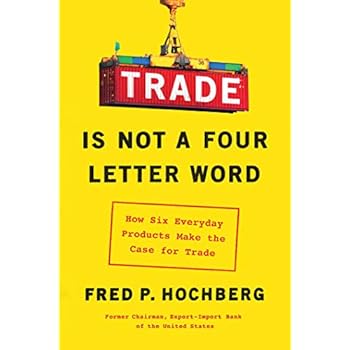Book Details Title: Trade Is Not a Four-Letter Word: How Six Everyday Products Make the Case for Trade | |
Book DescriptionReview “Trade Is Not a Four-Letter Word is a clear-eyed, informative defense of the importance of free trade. If you’ve ever wondered what makes it possible to enjoy all the products that make daily life possible, this book is for you. And if you haven’t thought about trade, this engaging book will make trade a fascinating subject, one that you never knew you were interested in.” —Indra Nooyi, former CEO of Pepsi-Co“Written by a uniquely qualified expert, this is a witty, enjoyable book that makes clear the great benefits—but difficult politics and policy choices—of international trade.” —Frederick W. Smith, Founder and CEO, FedEx Corporation“By turns practical and insightful, Fred’s indefatigable spirit, sound judgement, and depth of experience shine through in Trade Is Not a Four-Letter Word. Throughout his unique upbringing and accomplished career, which spanned a period of profound political and economic change, Fred set a standard of leadership and level-headed collaboration while dealing with the complex issues around global trade and the many ways it impacts our day-to-day lives. And these meaningful lessons about trade apply to all of us—in business and in life.” —Jamie Dimon, Chairman & CEO, JP Morgan Chase“Think a trade war with China and the rest of the world doesn’t impact you? Think again. Fred Hochberg shows how much free trade shapes your everyday life—and what would happen if it disappeared—in this fascinating journey through the trade networks that make our lives possible. It’s the only book on trade you’ll ever need to read.” —Ana Navarro, CNN Political Strategist“Timely [and] engaging.” —Financial Times“A sprightly and clear-eyed testimonial to the value of globalization.” —The Wall Street Journal“Hochberg has written an expert defense of trade while also explaining the myths that have clouded our understanding of the ways in which trade fits into everyday life . . . . An accessible, necessary book that will increase our understanding of trade and economic policies and the ways in which they impact our daily lives. Highly recommended.” —Library Journal (starred review)“A rousing, well-argued defense of global trade in a time of isolationist entrenchment.” —Kirkus“If you want to understand the importance of global trade to a vibrant U.S. economy, read this book!” —David Rubenstein, Co-Executive Chairman, The Carlyle Group“[A] quip-filled and illuminating debut . . . Lay readers looking to reach a more informed opinion on trade policy would do well to pick up this nuanced and approachable account.” —Publishers Weekly Read more About the Author Fred P. Hochberg served as the chairman and president of the Export-Import Bank of the United States under President Obama from 2009 to 2017, becoming the longest-serving chairman in the agency’s history. Hochberg also served for five years as dean at the New School in New York City and has been a fellow at the Institutes of Politics at both the Harvard Kennedy School and the University of Chicago. Previously he served as acting administrator of the Small Business Administration under President Clinton. Before entering public service, Hochberg spent almost two decades leading his family’s direct-marketing business, Lillian Vernon, where he oversaw a forty-fold increase in revenue. Read more Customers Review: A tariff is a tax, says author Hochberg in his humorous style, on importers and costumers of the country imposing the tariffs. Hochberg is a free trader. He notes that the entire industrial world needs parts and products from many countries to make products in their own country, automobiles being just one example he discusses. An American-made car is a pastiche of parts from several American small businesses as well as parts ftom foreign countries. And so it is with so many products we buy.In a tariff war there will always be winners and losers. A tariff imposed by, say, the United States, might benefit one industry but be detrimental to another domestic industry. So the benefitted industry adds jobs and opens more plants, but the disadvantaged industry closes plants and reduces its work force. So tariffs have to be evaluated on that basis. The author is clearly biased against President Trump’s trade and tariff policies, not that some of his criticisms aren’t justified. But the politically biased overtones is what caused me to give four, rather than five, stars for this review.Nonetheless, this book is well worth reading. You’ll see trade in a different light. I sure do. | |

